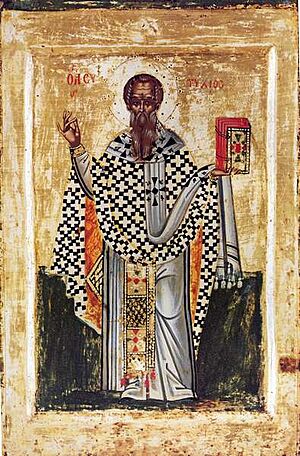Eutychius of Constantinople facts for kids
Quick facts for kids Saint |
|
|---|---|
| Ecumenical Patriarch of Constantinople | |

Icon of Eutychius, 16th century
|
|
| Enthroned | 552 |
| Reign ended | 565 577–582 |
| Personal details | |
| Born | c. 512 Theium, Phrygia, Byzantine Empire (modern-day Anatolia, Turkey) |
| Died | 5 April 582 Constantinople, Byzantine Empire (modern-day Istanbul, Turkey) |
| Denomination | Chalcedonian Christianity |
Eutychius (born around 512 – died April 5, 582) is a respected saint in both the Catholic and Eastern Orthodox Christian faiths. He served as the top religious leader, known as the patriarch of Constantinople, during two different periods: from 552 to 565, and again from 577 to 582.
His time as patriarch happened when Justinian the Great was emperor. Eutychius faced some disagreements with both the emperor and the Pope. The Orthodox Church celebrates his feast day on April 6.
Contents
Early Life and Becoming a Leader
Eutychius was born in a place called Theium in Phrygia. His father, Alexander, was a general who worked for the famous Byzantine commander Belisarius. We know a lot about Eutychius's life because his chaplain, Eustathius, wrote a full story about him.
When Eutychius was 30, he became a monk in Amasya. Later, he became an important church leader called an archimandrite in Constantinople. He was highly respected by the then-Patriarch of Constantinople, Menas. When Menas died, Emperor Justinian chose Eutychius to become the new Patriarch.
First Time as Patriarch (552-565)
When Eutychius became patriarch, Pope Vigilius was in Constantinople. Eutychius sent the Pope a message about his new role. He also shared his beliefs, which were in line with the Christian Church at that time.
The Pope asked Eutychius to lead an important church meeting. This meeting was called to discuss a disagreement known as the "Three-Chapter Controversy." Even though the Pope later changed his mind, the meeting went ahead on May 5, 553, in Constantinople. Eutychius played a leading role in this meeting.
This meeting later became known as the Fifth General Council. It ended on June 2, 553. Eutychius supported the decisions made at this council.
Disagreement with the Emperor
Eutychius had always supported Emperor Justinian. In 562, he even helped dedicate the new Hagia Sophia church. However, things changed in 564. The Emperor started to believe in a new idea from a group called the Aphthartodocetae. This group believed that Christ's body on Earth could not be hurt or decay.
Eutychius strongly disagreed with this idea. He explained that it didn't match what the Bible said. Emperor Justinian wanted Eutychius to agree with him, but Eutychius refused.
Because Eutychius wouldn't change his mind, Justinian ordered his arrest. On January 22, 565, soldiers took Eutychius away while he was celebrating a church holiday.
Arrest and Time Away
Eutychius was first taken to a monastery and then to another one near Chalcedon. Eight days later, Emperor Justinian called a meeting of important leaders. He asked Eutychius to come, but Eutychius said he would only come if he was judged fairly as a church leader.
Since Eutychius didn't show up, he was found guilty by default. He was sent to an island called Principus and later to his old monastery in Amasya. He stayed there for more than 12 years.
Return to Constantinople
When the new patriarch, John Scholasticus, died, the people of Constantinople really wanted Eutychius to come back. The new emperor, Justin II, and his young co-ruler, Tiberius, agreed.
In October 577, they sent people to bring Eutychius back to Constantinople. People said that a huge crowd met him as he entered the city. They cheered loudly, welcoming him back. He rode into the city on a young donkey, just like Jesus did in the Bible stories. People spread their clothes on the ground, carried palm branches, danced, and sang. The whole city was lit up, and there were big parties.
The next day, Eutychius met the emperors. He was given great honor at the Church of the Virgin. Then he went to Hagia Sophia, stood in the pulpit, and blessed the many people. It took him six hours to give out communion because everyone wanted to receive it from him.
Later Beliefs and Death
Towards the end of his life, Eutychius had a new idea about what our bodies would be like after we rise from the dead. He thought they would be "lighter than air" and not solid anymore. This idea caused another disagreement.
The future Pope Gregory the Great, who was in Constantinople at the time, disagreed with Eutychius. He used a Bible verse from Luke to argue his point. Emperor Tiberius tried to help them agree, but they couldn't.
Eutychius died peacefully on the Sunday after Easter, when he was 70 years old. Some of his friends later said that just before he died, he touched his hand and said, "I confess that in this flesh we shall rise again." This was a quote from the Bible.
 | Lonnie Johnson |
 | Granville Woods |
 | Lewis Howard Latimer |
 | James West |

